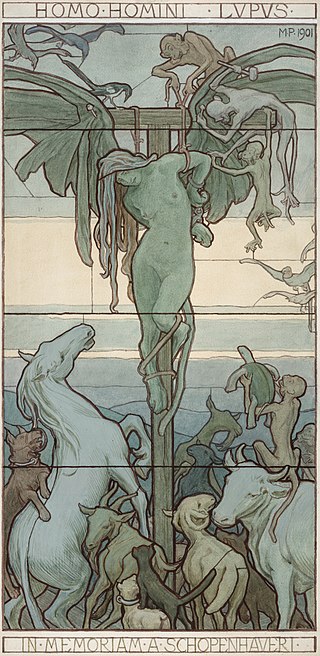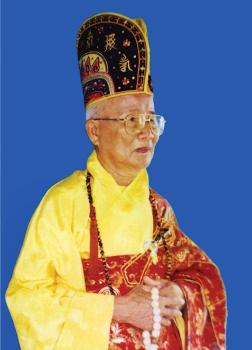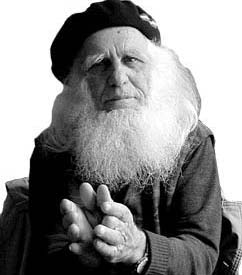
One World is a human rights film festival, held annually in Prague and other 36 cities of the Czech Republic, with a selection later shown in Brussels and other countries. The festival highlights quality documentary films on social, political, environmental, media and human rights issues. One World presents over 100 documentary films from all around the globe and organizes numerous Q&As with filmmakers and experts.
Manevri na petiya etazh is a comedy movie released in Bulgaria in 1985. It was directed by Petar B. Vasilev and written by Chavdar Shinov. It is a nice presentation of the passions and the intrigues developing in a socialist firm in mid-eighties, when it comes to business trips abroad.
Locanda delle Fate is an Italian progressive rock band from the end of the Italian progressive rock movement.
De Cive is one of Thomas Hobbes's major works. The book was published originally in Latin from Paris in 1642, followed by two further Latin editions in 1647 from Amsterdam. The English translation of the work made its first appearance four years later under the title Philosophicall rudiments concerning government and society.

Homo homini lupus, or in its unabridged form Homo homini lupus est, is a Latin proverb meaning literally "Man to man is wolf". It is used to refer to situations where a person has behaved comparably to a wolf. In this case, the wolf represents predatory, cruel, and generally inhuman qualities.

Thích Huyền Quang was a Vietnamese Buddhist monk, dissident and activist. At the time, he was the Patriarch of the Unified Buddhist Church of Vietnam, a currently banned organisation in his homeland. He was notable for his activism for human and religious rights in Vietnam.

Man Is Wolf to Man: Surviving the Gulag from the Latin Homo homini lupus is a memoir by Janusz Bardach, primarily surrounding the years during World War II. It was co-written with Kathleen Gleeson. The book tells the story of Bardach's transformation from placid student in pre-war Poland, to a Communist convert after the Soviet Union's bisecting of the country with Germany, and then follows him through his trial for treason and sentence of forced labor in the camps in the Kolyma region of Siberia. Throughout, Bardach's accounts show the sacrifice, toil, and luck necessary to survive in a Stalinist-era labor camp.
Cardiobacterium hominis /ˌkɑːrdiəʊbækˈtɪəriəm ˈhɒmɪnɪs/ is a microaerophilic, pleomorphic, fastidious, Gram-negative bacterium part of the Cardiobacteriaceae family and the HACEK group. It is most commonly found in the human microbiota, specifically the oropharyngeal region including the mouth and upper part of the respiratory tract. It is one of the causes of endocarditis, a life-threatening inflammation close to the heart's inner lining and valves. While infections caused by Cardiobacterium hominis are uncommon, various clinical manifestations are linked to the bacterium, including meningitis, sepsis, and bone infections.

6-ty ostatni przystanek is the name of the 2004 album by Polish band Ich Troje, released on Decca Records. The album is known as 6. ostatni przystanek in the native Polish. All tracks are in the Polish language.

Svetlana Alekseevna Gannushkina is a mathematician and human rights activist in Russia who was reported to have been a serious contender for the 2010 Nobel Peace Prize.
The Homo Homini Award is given annually by the Czech human rights organization People in Need to "an individual in recognition of a dedication to the promotion of human rights, democracy and non-violent solutions to political conflicts". The award is presented at the One World Film Festival, the world's largest human rights film festival.

Gheorghe Briceag was a Moldovan human rights activist notable for his opposition to Soviet rule. In the 1940s, Briceag was given a ten-year sentence in the gulag for distributing anti-communist flyers; he was forced to work in coal mines for the length of his sentence. His prisoner number was "P169". After his release, he was sentenced to seven more years of exile. He later became a symbol of resistance to Soviet occupation of Moldova.

Thoughts for the Time of War and Death is a set of twin essays written by Sigmund Freud in 1915, six months after the outbreak of World War I. The essays express discontent and disillusionment with human nature and human society in the aftermath of the hostilities; and generated much interest among lay readers of Freud.

Maximilian Pirner was a Czech painter. He was a member of the Vienna Secession, and associated with the Mánes Union of Fine Arts.
Matteo Rovere is an Italian filmmaker. He's the youngest Italian filmmaker to have won the Nastro d'argento for best producer, with I Can Quit Whenever I Want.

Homo Homini is the first monument in Europe to commemorate the victims of the September 11 attacks in the United States. It is located in Kielce in Poland. The monument was designed by Adam Myjak and was unveiled on September 11, 2006, on the fifth anniversary of the attacks. During the opening ceremony, George W. Bush's letter to citizens of Kielce was read out, and students from Kielce schools lit up grave candles. Each grave candle was inscribed with information, giving a single victim's name and occupation.
Phạm Đoan Trang is a Vietnamese author, blogger, journalist, publisher, and democracy activist. She received the 2017 Homo Homini Award from People In Need, who called her "one of the leading figures of the contemporary Vietnamese dissent". In 2024, she is in prison after being convicted of “conducting propaganda against the State of the Socialist Republic of Vietnam”.
Souad Nawfal is a Syrian Muslim schoolteacher and activist who became known for her protests against Bashar al-Assad and the Islamic State (ISIS) in Syria. She received the Homo Homini Award, a human rights award, in 2014.

Classroom of the Elite is an anime television series based on the light novel series of the same name written by Shōgo Kinugasa and illustrated by Shunsaku Tomose. The third season of the series was announced in March 2022, with Lerche returning to produce from the previous two seasons. The season is directed by Yoshihito Nishōji, with Kishi and Hashimoto returning as chief directors, and Morita as the character designer. Yasushi Shigenobu and Hayato Kazano served as screenwriters. Masaru Yokoyama and Kana Hashiguchi are composing the music. The season was adapted from the remaining volumes of the first-year arc, and was scheduled to be released in 2023, but was delayed to January 2024. The third season aired from January 3 to March 27, 2024. The opening theme song is "Minor Piece", performed by ZAQ, while the ending theme is "Konsei Dai Kakumei", and FIXER, performed by Yui Ninomiya.










